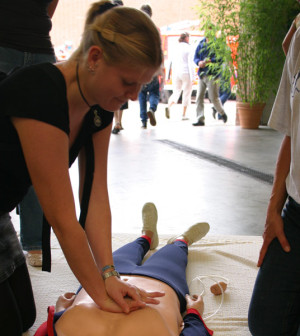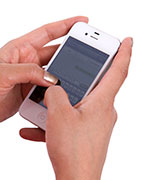- Could Your Grocery Store Meat Be Causing Recurring UTIs?
- Are You Making This Expensive Thermostat Error This Winter?
- Recognizing the Signs of Hypothyroidism
- 10 Strategies to Overcome Insomnia
- Could Artificial Sweeteners Be Aging the Brain Faster?
- Techniques for Soothing Your Nervous System
- Does the Water in Your House Smell Funny? Here’s Why
- Can a Daily Dose of Apple Cider Vinegar Actually Aid Weight Loss?
- 6 Health Beverages That Can Actually Spike Your Blood Sugar
- Treatment Options for Social Anxiety Disorder
Using ‘Heartphone’ to Detect Cardiac Irregularity


Smartphones could help improve detection and management of the common heart rhythm problem called atrial fibrillation, researchers say.
More than 36 million Americans use wireless body sensors to track their heart rate during physical activity, and that number is expected to grow to 135 million by 2018, according to background notes with the study.
The researchers gave 865 study participants smartphone-enabled electrocardiogram (ECG) sensors. Heart activity was recorded at 30-second intervals and transmitted to a secure cloud-based server.
Over six months, the participants transmitted more than 57,700 ECGs. Atrial fibrillation was detected in 185 recordings and in 11 percent of the participants, according to the study scheduled for presentation Friday at the annual meeting of the Heart Rhythm Society, in Boston.
“Having an ECG device on smartphones is quite incredible because it makes tracking heart health and behavior accessible to almost anyone,” said lead author Dr. Leslie Saxon, executive director of the University of Southern California Center for Body Computing.
“The experience of using an ECG device through a smartphone creates opportunities for people to truly pay attention and understand their heart rhythm,” Saxon said in a society news release.
Not only does this type of smartphone app allow the patient to be more informed, it also gives doctors the ability to access and analyze real-world data, she added. Ultimately, this can “help improve treatment and overall quality of care,” she said.
Atrial fibrillation affects more than 2.7 million American adults, and that number is expected to more than double in the next 30 to 40 years, according to the news release.
Studies reported at meetings are usually considered preliminary until published in a peer-reviewed journal.
More information
The U.S. National Heart, Lung, and Blood Institute has more about atrial fibrillation.
Source: HealthDay
Copyright © 2026 HealthDay. All rights reserved.










